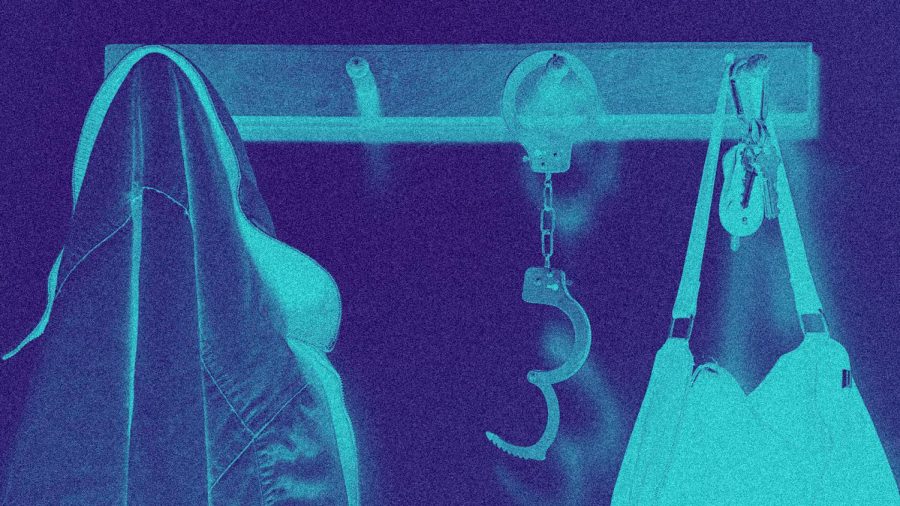Alexander & Cushman: Black Hair in Prison Deserves More Compassion
(Graphic by Sydney Stam | The Daily Utah Chronicle)
April 21, 2022
When Shia Milan Yearwood’s photo was posted to a Twitter mugshot page in 2018, it boosted her braiding business. Yearwood’s experience, however, contrasts how the criminal justice system typically limits and regulates Black hair.
There is more action to accept Black hair texture and style in workplaces, schools and other public areas. Last March, the U.S. House of Representatives passed the CROWN Act to ban race-based hair discrimination. But this discussion has not expanded to include accepting Black hair in prisons. Prison limitations and regulations that unduly affect and target Black hair must change as part of our effort to accept Black hair.
Discrimination Against Black Hair
Racism stays alive in prison in part through haircare. Haircare limitations implicitly enforced by expensive and limited commissary items make it difficult for prisoners to maintain healthy hair. While commissary items often match the price of similar products outside of prison, prison wages are substantially less than wages outside cell walls. One study comparing commissary use across three U.S. prisons found that prisoners spend, on average, $947 per year at the commissary, but wages in those three prisons ranged from only $180 to $660 per year.
Additionally, shopping at commissaries is not like shopping at a local supermarket. Commissaries have a limited product selection. Even then, available hygiene and beauty products are often for white people, making them useless for Black women’s hair or skin. The challenge of hair care in prison is even harder for Black people, who often use bonnets to protect hair during sleep.
Many prisons have regulations that apply almost exclusively to Black hair. For instance, in 2015, one Texas jail had a rule requiring inmates to “remove hair weaves, even if they’re braided, glued or sewn into the hairline.” Failure to comply could result in the forcible removal of the weaves. A haircut or style can mean a lot to inmates. Hair choice makes them feel like themselves in an environment that strips their personality. Yet we still allow regulations that discriminate against Black hair and predominantly limit Black hair care in prisons.
Differential Treatment is Rooted in Racism
A lot of these limitations and regulations we set on Black hair in prison result from negative connotations and racist beliefs surrounding Black hair. Black hair is often called nappy, ugly and bad compared to fine and straight hair. In prison, these beliefs are reinforced through inhumane treatment and forcible haircuts.
A Black inmate in Pennsylvania was forced into solitary confinement for over a year after refusing to cut his dreadlocks, which he believed gave him strength based on his religion. The inmate also claimed that correctional officers often ordered prisoners of color to remove their hats and run their fingers through their hair to “check for contraband,” but never ordered white prisoners to do so. In another example, an Illinois prisoner had his dreadlocks forcibly removed by a prison guard after the guard claimed the inmate posed a security risk. However, the guard failed to provide a reason for the security risk and instead made an unnecessary and excessive demonstration of power to carry out his own prejudiced beliefs and dehumanize a Black person.
Someone’s status as an inmate does not justify humiliating them. Guards and correctional officers do not have the right to brutalize Black people through inhumane treatment and forced haircuts. Many prison officials and guards justify their racist practices by citing grooming standards, which exist to promote the safety of prisoners and guards as well as the hygiene of inmates. There are concerns about inmates sneaking contraband or weapons into prisons through their hair, and promoting these grooming standards acts as a measure of cleanliness and safety. However, these absurd grooming standards are rooted in historical stereotypes and negatively affect Black people. Black bodies have historically been characterized as dirty and diseased, stereotypes that started during the Atlantic Slave Trade and persisted throughout the Civil Rights Movement.
Now, these stereotypes affect Black people through contemporary acts of discrimination against their hair, whether they are incarcerated or not. Through prison grooming policies, prisons employ methods that dehumanize and show our culture’s discomfort with Black people. Whether limitations or direct regulation stop Black people from caring for their hair in prisons or simply wearing it, Black hair discrimination is rooted in a history that doesn’t respect Black people the way it does white people.
While the progress of accepting Black hair in workplaces and schools is inspiring, we need the same push for acceptance of Black hair within prisons. Prisons utilize racist grooming standards that deny hair care and limit acceptable hairstyles for Black inmates, or worse, punish inmates for their natural hair care. For some prisoners, hair is a way for them to hold onto their former selves, be in control and take care of their hygiene. By denying them hair care, prisons deny them decency. Black men and women are deserving of compassion and humanity, just like their white counterparts, and it doesn’t matter if they’re sitting in a jail cell or not.










Sue Garcia • May 8, 2022 at 4:41 am
How can I reach out to someone about this very important topic ?.